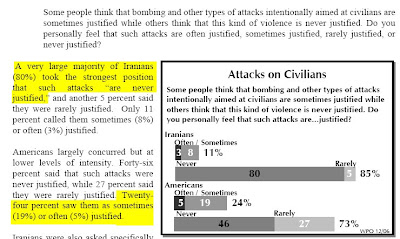(updated below)
The hysteria over the Pew poll about American Muslims continues unabated, with the focus now on the finding that while 80% of American Muslims oppose attacks on civilians in all cases, 13% said they could be justified in some circumstances. The “discussion” illustrates some standard failings of our political discourse.
Michelle Malkin went to National Review to proclaim that the poll “should be a wake-up call, not another excuse for the mainstream media to downplay the threat of homegrown jihad.” Mark Steyn said it demonstrates the existence in America of “a huge comfort zone for the jihad to operate in,” and Jonah Goldberg warned how “significant” this is. On CNN last night, Anderson Cooper was horrified — just horrified — that “so many” American Muslims would support such violence.
The reality, though, is that it is almost impossible to conduct a poll and not have a sizable portion of the respondents agree to almost everything. And in particular, with regard to the specific question of whether it is justifiable to launch violent attacks aimed deliberately at civilians, the percentage of American Muslims who believe in such attacks pales in comparison to the percentage of Americans generally who believe that such attacks are justifiable.
The University of Maryland’s highly respected Program on International Public Attitudes, in December 2006, conducted a concurrent public opinion poll of the United States and Iran to determine the comparative views of each country’s citizens on a variety of questions. The full findings are published here (.pdf).
One of the questions they asked was whether “bombings and other types of attacks intentionally aimed at civilians are sometimes justified”? Americans approved of such attacks by a much larger margin than Iranians — 51-16% (and a much, much larger margin than American Muslims — 51-13%):
A rather substantial 24% of Americans thought that such attacks are justified “often” or “sometimes,” while another 27% thought they were justified in rare cases. By stark contrast, only 11% of Iranians think such attacks are justified “often” or “sometimes,” with a mere further 5% agreeing they can be justified in rare cases. Similar results were found with the series of other questions regarding violence deliberately aimed at civilians — including women, children and the elderly. Americans believed such attacks could be justifiable to a substantially higher degree than Iranians.
As Kenneth Ballen noted in The Christian Science Monitor in February of this year, Americans express greater support for “attacks against civilians than any major Muslim country except for Nigeria.” Make of that what you will — and its meaning is debatable — but those are just facts.
In general, polling data can be used to document all sorts of pernicious views held by a sizable number of respondents. One recent poll found that 15% of Americans would either outright refuse to vote for, or would have reservations about voting for, a black presidential candidate even if he were qualified (12% would outright refuse to vote for a Hispanic, 11% for a woman, and 14% for a Jew). A 1999 poll of Americans found that 34% answered “yes” — 34% — when asked: “If you honestly assessed yourself, would you say that you have at least some racist feelings?” And 18% of Americans believe that “the U.S. should use nuclear weapons even if it has not suffered a nuclear attack.”
The reality of that Pew poll is that, generally and comparatively speaking, it demonstrates just how unremarkable, assimilated, peaceful and consummately American is the American Muslim population. If anything, support for violence — including against civilians — is notably less than it is among Americans generally. Again, those are just facts. Yet by manipulating the polling data and failing to discuss it comparatively, an impression is quickly solidifying, as intended, that there are throngs of scary and threatening jihadist Muslims — both in our midst and around the world — waiting to launch suicide attacks on us, and that necessitates the euphemistic Malkian “wake-up call.”
UPDATE: And then there is this poll (h/t d):
More than one-third of U.S. soldiers in Iraq surveyed by the Army said they believe torture should be allowed if it helps gather important information about insurgents, the Pentagon disclosed Friday. . . .
In addition, about two-thirds of Marines and half the Army troops surveyed said they would not report a team member for mistreating a civilian or for destroying civilian property unnecessarily. “Less than half of Soldiers and Marines believed that non-combatants should be treated with dignity and respect,” the report stated.
About 10 percent of the 1,767 troops in the official survey — conducted in Iraq in the fall — reported that they had mistreated civilians in Iraq, such as kicking them or needlessly damaging their possessions.
Ten percent admitted to having abused civilians for no reason, which suggests that the actual number is higher, likely substantially. And as documented in yesterday’s post, majorities of American Christians believe in the use of torture. There is obviously a small number of American Muslims who are sympathetic to even the most appalling acts of Islamic extremism, but support for brutal and indefensible acts is found — at least as much — within every comparable group.


